FEATURE: What’s in a Yale Education?
Looking back at a year of student protests. A feature exploring questions related to Yale’s role in society, the educational value of campus activism, why arrests were made, student safety on campus, and the future of student activism when Yale won’t budge.
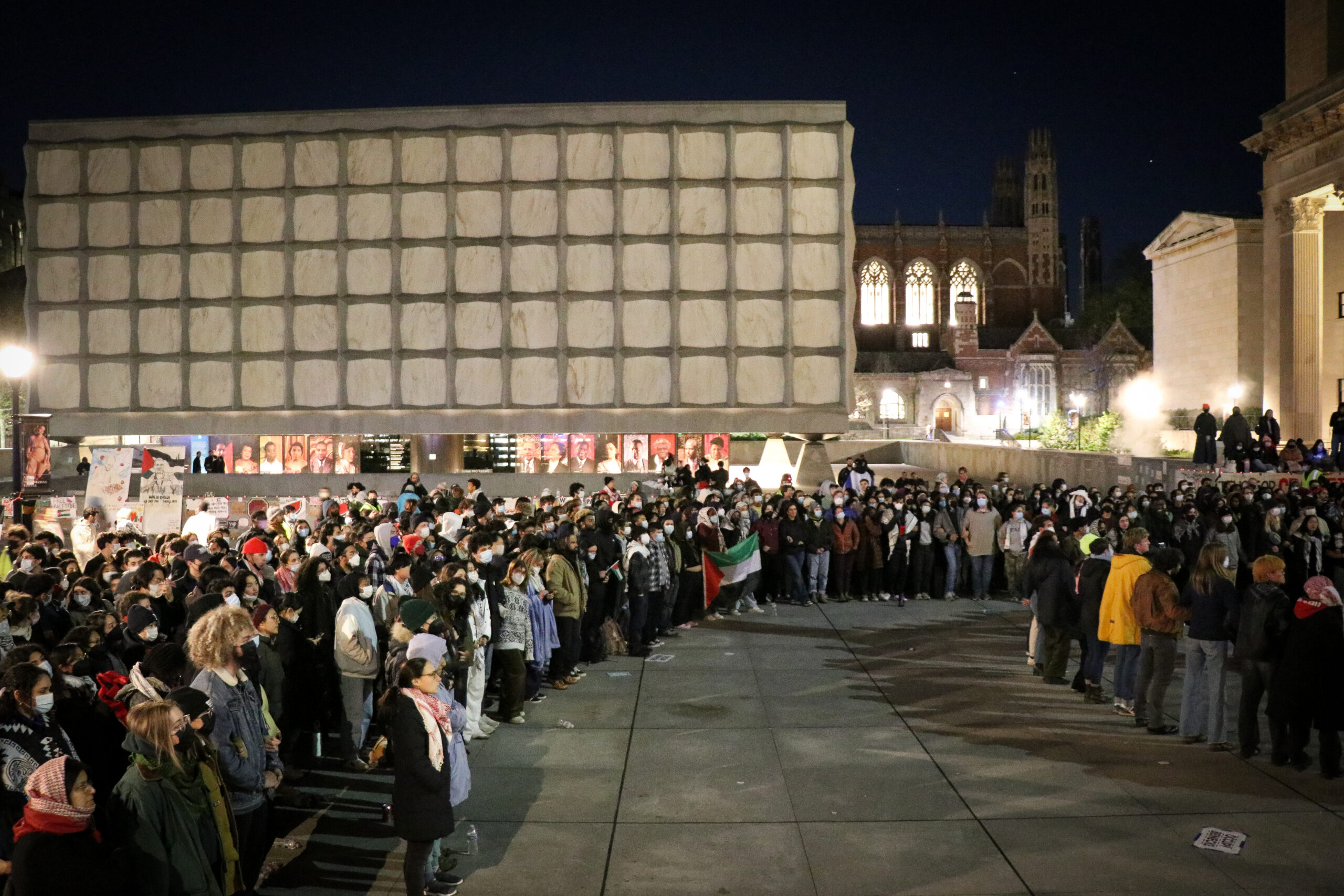
When Craig Birckhead-Morton ’24 was arrested for the first time, on Beinecke Plaza on April 22, 2024, it was on purpose. The arrest was an act of civil disobedience meant to force the University to recognize the past seven months of protests and the war in Gaza.
His second arrest — at a rally on May 1, his twenty-second birthday — was unexpected. While the rally was on Alexander Walk, police issued a warning calling for protesters to leave. Since several police cars had surrounded the protest at that point, Birckhead-Morton approached a police officer to ask where it would be convenient for protesters to disperse. He was immediately arrested and then charged with two counts of first-degree criminal trespass and one count of disorderly conduct.
Birckhead-Morton is currently pursuing a master’s degree in Middle Eastern, South Asian, and African Studies at Columbia University. He is still connected to Yale and the ongoing protests, both in spirit and by necessity. He returned to New Haven on September 19 for a court hearing in which his charges from May 1 were dismissed and his first-degree trespassing charge from April was lowered to simple trespass. He has no criminal record.
Since last October, pro-Palestine student organizers at Yale have set up multiple encampments on university property, staged rallies, and organized teach-ins to call for a ceasefire in Gaza and protest the University’s investment in weapons manufacturing companies. Students who support Israel have hosted counterprotests and demonstrations. Many students have held memorials for the hostages killed and taken by Hamas, as well as spoken out in national media about antisemitism at Yale.
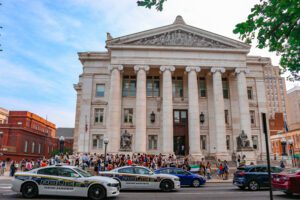
Photograph by Yalies4Palestine
Though students are generally united in their hope for global peace and security, sympathies on Yale’s campus are split between two sides of the same war.
But other forms of ideological bifurcation have emerged from the past year of student protests. Disagreements about activism at Yale often go beyond taking sides in the Israel-Gaza conflict; instead, they highlight fundamental disputes surrounding Yale’s role in society and its duty to students as an educational institution. As Yale gears up for another year of activism, student activists are confronting the tensions of campus activism head-on — to contradictory and at times hopeful results.
What is Yale’s role in society?
Yale’s endowment totaled $40.7 billion in June 2023. Within the 0.3 percent of the endowment which is publicly disclosed, the University has invested more than $110,000 in military weapons manufacturers through exchange-traded funds (ETFs) as of February 2024. In their rallies and encampments, student groups like Yalies4Palestine and the Endowment Justice Collective have consistently demanded Yale to disclose the entirety of their investments and divest from weapons manufacturers. According to an Endowment Justice Collective Instagram statement, without a formal policy on investments in weapons manufacturers or transparency mechanisms, there is no way of knowing whether Yale and its shell companies are investing more in the weapons industry.
Their detractors, however, believe that divestment needlessly complicates Yale’s purpose in society. It “introduces so many restrictions into the academic focus that Yale should be having,” said Isha Brahmbhatt ’24, former chairman of the Tory Party at Yale. She believes that the University’s global impact comes from its education of globally-minded students; the ethics of Yale’s investments or its stance on social issues are less consequential.
Within an institution that has educated much of the political elite of the U.S., including five U.S. presidents, a Yale education is still seen by many as a jumping pad for future global leaders. Elven Shum ’24, former vice-chairman of the Conservative Party at Yale, argues that Yale students are positioned uniquely to “amass their own power or influence” and eventually influence national policy. In the time before most students achieve “world leader” status, Shum advocates for volunteering at the local level: “Serving people at a soup kitchen is probably just as, or more impactful, compared to your individual add to whatever protest at Yale.”
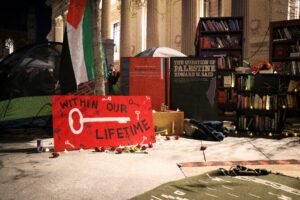
Photograph by Christina Lee
Shum and Brahmbhatt’s concept of Yale as a politically neutral, academically intense cradle that fosters future changemakers is partially shared by the University. In early September, University President Maurie McInnis announced the establishment of a committee to recommend whether Yale should refrain from commenting on matters of public significance. This move comes as many universities nationwide, including Harvard and Columbia, have adopted versions of institutional neutrality amidst a rise in student protests this year. Institutional neutrality, a concept which was first introduced in the University of Chicago’s 1967 Kalven Report, aims to protect free speech on campus by preventing the censure of minority voices who do not agree with the public view.
But Yale’s celebratory attitude towards its history of student activism suggests that being strictly politically neutral may erode some elements that the University prides in its education. A quote from anti-apartheid activist and first president of South Africa, Nelson Mandela, is carved on the granite wall north of the Beinecke Library — “YOUR FREEDOM AND MINE CANNOT BE SEPARATED.” The sculpted monument is, per the epigraph, “dedicated to the people of South Africa who were supported in their struggle for freedom by members of the Yale and New Haven communities.”
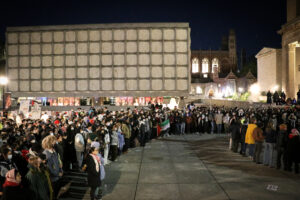
Photograph by Christina Lee
The memorial refers to the student protests of 1986, when student activists installed a shanty town on Beinecke Plaza calling for Yale’s divestment from companies doing business in apartheid South Africa. After ten days, campus police dismantled the encampment and arrested over 70 students. According to the Yale Investment Office’s website, the University did eventually adopt divestment policies in the early 1990s — but only after Congress had passed the Comprehensive Anti-Apartheid Act in 1986 and many multinational companies had already withdrawn from South Africa.
Despite Yale’s efforts to shut down the anti-apartheid student movement in the 1980s, it now celebrates these protests’ success in one of the most prominent campus spaces. The University continues to broadcast its students’ historical involvement in campus activism; last year, the Sterling Memorial Library hosted an exhibition commemorating campus protests in support of New Haven’s Black Panthers on trial.
These commemorations indicate that the University considers civic engagement part of its education. But Yale’s endorsement of activism has always been retroactive.
An education in activism?
In student activist spaces, education goes beyond seminar readings: it consists of learning from others’ lived experiences. Over the past year, pro-Palestine activists at Yale have organized through means other than mere disruption of campus life. Through teach-ins, reading weeks and screenings, they seek to educate themselves and other students on the situation in the Middle East.
During the ten-day occupation of Beinecke Plaza in April, at the Gaza Solidarity Encampment, protesters held a zine-making workshop and conversation with Sophia Stamatopoulou-Robbins, professor of anthropology at Bard College. Omnia El Shakry, professor of history at Yale, hosted a teach-in about anti-colonial revolt and the Palestinian condition. James Forman Jr. LAW ’92, J. Skelly Wright Professor of Law, spoke to students about his experience organizing with the anti-apartheid student group Brown Divest/Free South Africa during his undergraduate years at Brown.
“You should constantly be asking yourself, are we taking the time to learn from people who were doing it before?” Forman advised an attentive crowd of more than 70 student protesters on April 19. While students can be on the vanguard of activism because of the lack of established institutional structure, he said, this also means that it is hard for them to learn lessons from previous experiences and connect to the lineage of activism from decades ago.
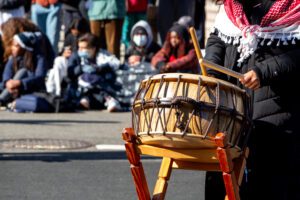
Photograph by Giri Viswanathan
Still, Yale institutions have shut down educational forms of student activism. Danya Dubrow-Compaine ’25 is an organizer with Yale Jews for Ceasefire and J Street U. To her, these organizations are spaces for those who feel alienated from mainstream Jewish institutions because of their views on the war; they also offer opportunities to educate the student body on Zionism and its history.
Dubrow-Compaine and others in J Street U planned to screen a documentary named Israelism at the Slifka Center for Jewish Life in December 2023. The documentary, which follows two young American Jews as they learn about how the version of Israel they were taught in Jewish institutions differed from Israeli policy and people in the Middle East’s lived reality, was controversially received in the States and on college campuses like Hunter College, where campaigns were held to stop the film’s screening.
At Yale, the Slifka Center’s Board of Directors originally approved the screening before reversing the decision one week before the event. Students held the screening in the basement of Silliman College instead. In a conversation with Uriel Cohen, the executive director of the Slifka Center, Dubrow-Compaine learned that the approval was retracted because of concerns regarding external backlash from donors and Hillel International. (In an email to the Magazine, Cohen wrote that donor contributions do not change or impact Slifka Center’s mission, values or methodologies.)
Jewish students’ endeavors to screen Israelism at the Slifka Center illustrate how activists attempt to disrupt the ideological status quo at Yale through education, both among the student population and within Yale’s official institutions. “Israelism is a documentary making very well founded mainstream critiques of settlements in the West Bank, and yet it was deemed to be beyond the pale in a way that right-wing speech on Israel specifically is just often not,” said Elijah Bacal ’27, who is involved in J Street U and Yale Jews for Ceasefire.
Shutting down the protests: for student safety?
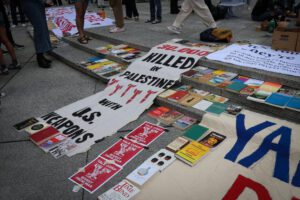
Photograph by Christina Lee
While student organizers maintain the value of campus activism within an educational institution like Yale, the University has often taken action to quell ongoing protests and prevent future rallies from evolving into larger occupations.
On April 22, 48 protesters (44 Yale students, a Yale employee, and three New Haveners) were arrested by Yale police and charged with criminal trespassing after police raided the encampment on Beinecke Plaza. On May 1, four people were arrested (two Yale students, two New Haveners) towards the end of a demonstration on campus; the arrest of a non-Yale affiliate involved the use of disproportionate force. The University claims that these arrests were made in order to protect students’ safety.
Right after the arrests, former University President Salovey wrote in a statement to the Yale community that student protesters had chosen to end conversations with Yale deans, rejecting offers to end the protests and meet with trustees. At that point, the administration determined that “the situation was no longer safe,” as they “became aware of police reports identifying harmful acts and threatening language used against individuals at or near the protest sites.”
Following the police reports, Chabad at Yale released a statement on April 21 condemning “brazen antisemitism” during the period of Beinecke protests: “The situation came to a head last night, when unauthorized protests blocking common areas led to a hostile and dangerous confrontation for Jewish students on campus. A dear and beloved student leader of Chabad at Yale was surrounded and struck by a sharp object and ended up in the hospital.” The student wrote about the incident in the Yale Free Press and spoke on national media about it; her account has since been questioned by other journalists and outlets.
Rabbi Meir Chaim Posner, the Jewish Life Advisor of Chabad at Yale, noted that at Yale, protests have mostly not devolved into violence, nor has he been afraid for his physical safety despite his being “visibly Jewish.” But physical safety is not the most pressing issue at hand, he said. “The issue is, is it okay to delegitimize a people on campus at Yale and not suffer any repercussions?”
Eytan Israel ’26, a Jewish student, wrote to the Magazine about his uncomfortable experience as a “visibly Jewish” person who wished to witness and document happenings at the Beinecke encampment. At the encampment’s perimeter, he had a student marshal step in front of him to prevent him from passing, he said. He criticized how some faculty members moved their classes to the Beinecke encampment, which was “not a place many Jewish students felt safe going to” due to chants like “Resistance is justified when people are occupied,” and “Globalize the intifada,” which he and other Jews understood as being justification for Hamas’s attacks and a call for a global revival of the 2000–2005 Intifada in Israel.
“Despite these slogans that were present at the encampments, almost every group chat in Yale was filled with messages that if you care about humanity and morality, you must come to support the encampments,” he said.
Given the accusations of antisemitism plaguing protest spaces, some Jewish student activists believe that it is even more important for them to speak up about the Gaza war. To Dubrow-Compaine, Jews for Ceasefire is “a way for Jewish students to shoulder some of the organizing labor for the Palestinian cause”: “People aren’t necessarily going to label us as antisemites in the way that they would label non-Jewish pro-Palestine activists.”
“The idea that arresting dozens of students peacefully protesting makes any of us safer is insane,” said Bacal, citing the necessity of freedom of expression and assembly on campus. “It’s true that individual Jewish students expressed feeling unsafe during the encampments, and I would never challenge the validity of their experience,” he said. “But the only thing the arrests made safer is Yale Corp’s bottom line.”
But when a second encampment was assembled on Cross Campus on April 28, more concerns started to arise
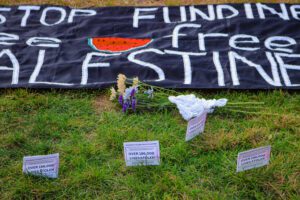
Photograph by Yalies4Palestine
about whether antisemitism was ideologically embedded in spaces of pro-Palestine activism. Organizers erected a sign listing “community guidelines” of the encampment, which included committing to “Palestinian liberation and fighting for freedom for all oppressed people” and a no-tolerance policy for antisemitism, Islamophobia and racism. A protest marshal told the News in April that if pedestrians chose not to support the community guidelines, marshals offered to escort them to the other side of Cross Campus.
In response, Salovey wrote in an email to the Yale community that “to claim control of a shared physical space and to impose an intellectual and ideological litmus test are not in keeping with our bedrock principles and values.” Eytan Israel agrees: “It doesn’t matter that there are Jews that were part of the encampment,” he said.
Yalies4Palestine told the Magazine that when organizers received feedback that people were “not feeling included and represented,” the coalition “collectively” took the guidelines down. The group also stated their belief in the difference between anti-Zionism and antisemitism: Zionism is an “imperial, colonial political ideology that was created in the early 20th century to justify the genocide and displacement of Palestinian peoples from their ancestral land,” they said, while anti-Zionism opposes that ideology and is “completely separate” from antisemitism.
“We are constantly striving to make our spaces feel welcome for people of all different backgrounds,” the group said, highlighting their collaboration with Jewish activist groups. “A part of that is constantly examining our messaging, and Jews for Ceasefire has been very helpful in collaborating with us and helping us create safer spaces.”
To Rabbi Posner, trying to establish a difference between antisemitism and anti-Zionism, and then excluding Zionist Jews from accessing campus spaces, is equivalent to having a “plausible deniability that I’m only targeting ‘this kind of a Jew,’” he said, “which doesn’t fly.” Zionism is the belief that Jews have a right to self determination in the land of Israel, he explained. “The moment someone believes that Israel is not a legitimate country, then that is antisemitic, period.”
Still, he believes that a version of “pro-Palestine” protests on campus can coexist with respect for Jewish people and non-antisemitism. “Even though it’s complex and I can’t say I agree, it would be a movement that sees Israel as legitimate, sees Israel as engaged in a legitimate struggle, and believes that the answer to that is through diplomatic negotiations.” These peaceful discussions happen in many Jewish communities, he said.
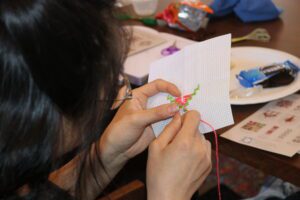
Photograph by Yalies4Palestine
Antisemitic actions at pro-Palestine protests are not the University’s only safety concern. Administrators have expressed unease about the “danger” of non-Yale affiliates participating in Yale protests. Salovey wrote in a University-wide email on April 22, after the arrests on Beinecke Plaza, that it was “concerning” that “some of those who joined students at Hewitt Quadrangle (Beinecke Plaza) in recent days were not members of the Yale community, and protesters were trespassing on campus overnight.”
Following police arrests in the morning, hundreds of protesters moved to blockade the intersection of Grove and College Streets, causing traffic to divert and Schwarzman Center, including Commons dining hall and the Elm cafe, to close for two days.
Afterwards, Pericles Lewis, Dean of Yale College wrote an email to Yale staff which was then leaked to student protest groups: “According to law enforcement, the core of the group holding the intersection outside Schwarzman are non-Yale protestors with a known history of violent confrontation with the police,” he wrote. “We have found that the presence of such outsiders has greatly increased danger at recent protests.”
A few hours later, Lewis retracted his words in a statement to the News: “My email regarding the protest at Grove and Prospect was mistaken and I apologize for the suggestion that the protesters might turn violent,” he wrote. “I was repeating speculation I had overheard and I should not have done so.”
Activists from non-Yale organizations — like those from several Muslim Student Associations in CT, chapters of Students for Justice in Palestine, and the Connecticut chapter of American Muslims for Palestine — also participated in the Yale protests.
Protesters were dissatisfied with the University’s response to their efforts in coalition building. Birckhead-Morton views the University’s statements as a strategy to “break up the movement by racializing and demonizing the communities which are acting in solidarity with student protestors.” This tension comes at a time period when the Yale administration is making consistent efforts to foster town-gown relations, including by increasing Yale’s voluntary payments to the city, establishing a commitment to offset the city’s loss in tax revenues, and helping fund public school tuition; Salovey’s Baccalaureate Address to graduating seniors in August 2023 also focused on the importance of community engagement in New Haven.
Yale won’t budge. What’s next for activism?
On April 17, at the peak of the first Beinecke Plaza occupation, Yale announced that the Advisory Committee on Investor Responsibility (ACIR) had concluded
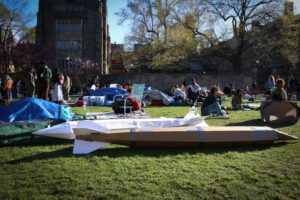
Photograph by Christina Lee
that “military weapons manufacturing for authorized sales did not meet the threshold of grave social injury, a prerequisite for divestment,” meaning that Yale would not be divesting from military weapons.
On September 28, three students advocating for Yale to disclose and divest from weapons manufacturers met with a member of the Yale Corporation for the first time. In the meeting, they presented a proposal for the University to disclose the percentage and dollar amount of Yale’s endowment that is invested in weapons manufacturers and suppliers; the trustee did not commit to the terms of the proposal.
In 2018, even with considerable student voices calling for divestment in Puerto Rican debt — including a movement occupying Cross Campus for three days — Yale concluded that divesting was unwarranted, suggesting that the University’s decisions are fairly independent of student pressure.
Beverly Gage ’94, John Lewis Gaddis Professor of History, reasons that the failure of student activism to truly change the distribution of power of the institution is due to the fundamental disadvantages that students have compared to Yale itself. “The administration has been here for a long time, and The Yale Corporation not only operates in relative secrecy, but is a long-standing, permanent site of power… Most substantial change takes a really, really long time to make it happen.”
Yet even if campus activism seems futile in the moment, the hands-on education it provides may prove valuable to aspiring organizers. Sunrise Movement, a student-led organization in the climate movement, mainly consisted of campus activists who formerly advocated for divestment in fossil fuels as a theory of change. But as they grew more experienced in leftist advocacy, they saw the shortcomings of divestment, revamped their organizing strategy and eventually partnered with Alexandra Ocasio-Cortez to create a national campaign for the Green New Deal that stretched beyond divestment and economic incentives for industries to cut carbon emissions.
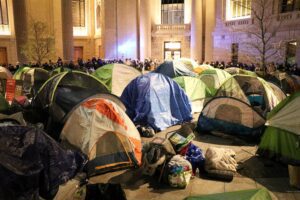
Photograph by Christina Lee
Still, to many student activists, the act of organizing at Yale is essential. Lumisa Bista ’25, an organizer in the Endowment Justice Collective (EJC) at Yale, organizes around awareness regarding Yale’s investments in exploitative industries and applies pressure on the University to divest. “It is a privilege to be able to separate ourselves from this war, but it is our responsibility to recognize that Yale is just as complicit in the atrocities,” she said. “Given that our education is tied to this corporation, it is our responsibility to challenge its wrongdoings.”
If campus protests are unable to force change at Yale, at the very least, they disrupt campus life, said Bista. During the Beinecke occupation, students were unable to pass through the Plaza without witnessing the swaths of protesters calling for a ceasefire, or the erected pop-up bookshelf, or the sign “ASK YOUR TOUR GUIDE ABOUT YALE’S INVESTMENT IN GENOCIDE.”
Student activism remains in the limelight this semester: as violence in the Middle East rages on, students have held a community gathering on Beinecke Plaza during Family Weekend, handed out “Yale Divest From War” pins to performance groups at Yale, and rallied with community members in solidarity with Lebanon. Both pro-Israel and pro-Palestine groups are hosting vigils and rallies around October 7th, 2024, the one-year anniversary of Hamas’s attack on Israel.
“The status quo hums along inoffensively and self-sufficiently due to its nature. Activism comes in and is, by its nature, loud and disruptive,” said Bacal. “I think people just have to understand that these things don’t arise in a vacuum.”







